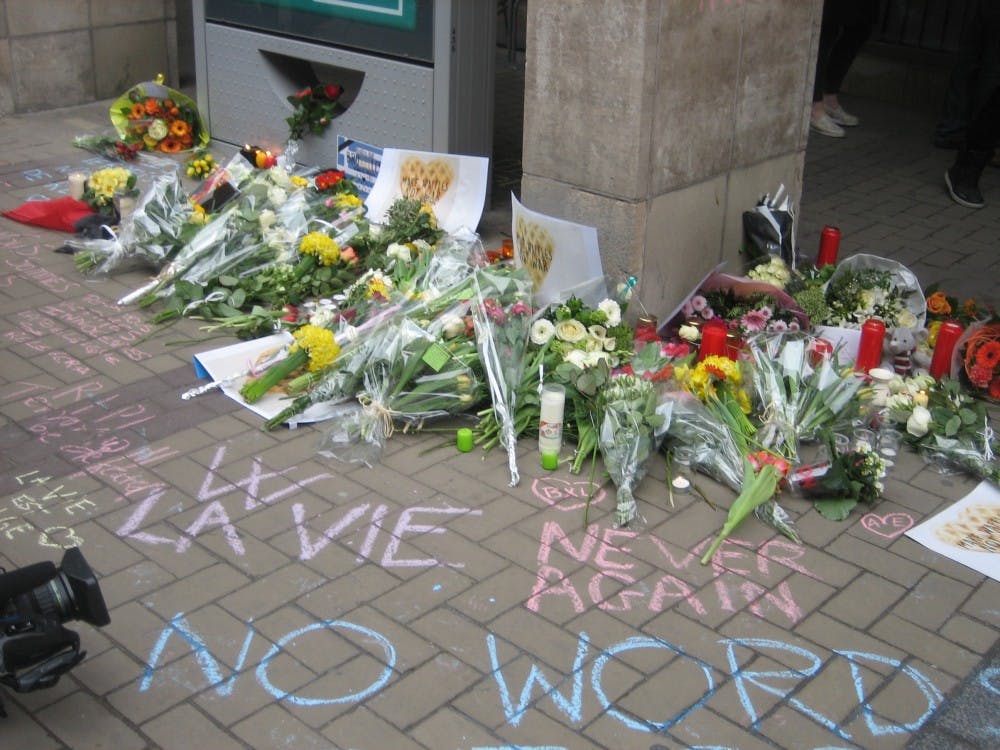Madison Lawrence, a junior studying abroad at the National University of Ireland in Galway, was riding a tour bus headed to several medieval towns surrounding Brussels when she first became aware of the terror attacks on Tuesday, March 22. A few hours outside of the city limits, the bus pulled over to the side of the road and the tour guide told the passengers of the attacks on Zaventem Airport and a train near the Maelbeek metro station, which killed 32 people and injured 270 others.
“He told us that we wouldn't be able to leave the city for a few days,” Lawrence said. “He wasn't even sure if he could get us back in.”
She returned to the city later that day, which was on lock-down with all major public areas closed. Lawrence said that the streets of Brussels had a very notable increase in police presence.
“They were everywhere, dressed in camo and holding huge guns,” Lawrence said. “It was very tense but you could tell people were really trying to go about their business as normal.”
Lawrence arrived at Belgium's Zaventem Airport on March 21, only a day before the attacks. Brussels was Lawrence’s first stop in a multi-country trip she planned for spring break. After the events on Tuesday, however, she decided to cut her trip short.
“I'm being honest here, the final decision wasn't made out of concern for my personal safety -- I'm doing it for my parents," Lawrence said. "I don't want to keep putting them through this."
Similar to its protocol during the Paris attacks last November, the Office of International Education contacted each student abroad in Europe and within 12 hours nearly everyone had replied. In an email sent out to abroad students, Martha Merritt, the dean of international education, urged students to remain in their host cities and refrain from traveling throughout Europe after the U.S. State Department issued a Travel Alert.
“This is a heightened alert due to the recent terrorist incidents in Belgium and in Turkey,” Dean Merritt wrote.
But the threat of more attacks in Europe will remain for the foreseeable future with the Islamic State making a clear statement that it will not be stopped. Authorities believe the metro and airport bombings were in retaliation of the arrest of Salah Abdeslam, who allegedly played a key role in the November Paris attacks that left 130 people dead.
The type of heavy police presence described by Lawrence is eerily similar to Belgium’s reaction after the Paris attacks. Sky Aitken, a junior who studied abroad last semester in Maastricht, flew almost exclusively out of Brussels’ Zaventem airport after taking an hour-long train ride from The Netherlands.
“Men dressed in army gear with machine guns would walk up and down the train at least three times during the hour- long train ride,” Aitken said. “I used the airport to fly back to the States, which was still scary and they were on high alert so my last memory of Brussels was army officials all throughout the airport with giant guns and dogs.”
Despite the growing sense of danger throughout the European continent, European study abroad remains one of Richmond’s most popular programs, with 251 applications for programs in the fall 2016 semester.
Enjoy what you're reading?
Signup for our newsletter
“Next year our numbers are coming in slightly higher than average,” Merritt said.
The dean emphasized that students going abroad in Europe are made aware of the added risk and are given advice on how to react in an emergency. The Office of International Education also remains in contact with students through email while they are abroad to inform them of potential threats.
If the State Department raises its notice to a Travel Warning, the office would share that information immediately with students in the targeted location and notify those who are planning to travel there.
“Each case receives individual treatment because the scope and type of risk can vary dramatically,” Dean Merritt said.
While enrollment in Richmond’s study abroad program remains very high despite the recent attacks, the threat of violence throughout Europe is not going away.
“The incidents of violence in Europe this year and last are understood by people who live there as part of a longer continuum,” Merritt said. “This is not meant to frighten people but rather to say that incidents of violence are not as uncommon as we would wish, either in the United States or in other countries.”
Lawrence, who will be returning to campus next fall, urged students going abroad not to be discouraged from traveling after the attacks.
“We're young and practically responsibility free,” Lawrence said. “Don't be afraid, just be prepared.”
Contact reporter Audrey Jordan at audrey.jordan@richmond.edu
Support independent student media
You can make a tax-deductible donation by clicking the button below, which takes you to our secure PayPal account. The page is set up to receive contributions in whatever amount you designate. We look forward to using the money we raise to further our mission of providing honest and accurate information to students, faculty, staff, alumni and others in the general public.
Donate Now



